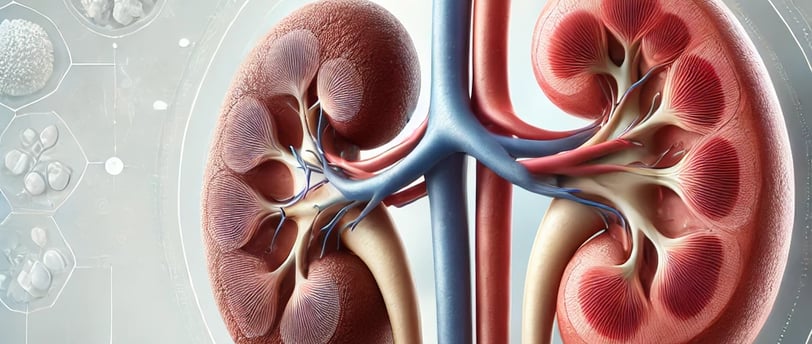Kimmelstiel-Wilson Syndrome: Understanding Diabetic Kidney Disease
Kimmelstiel-Wilson Syndrome (KWS), often referred to as diabetic nephropathy, is a condition that affects the kidneys of individuals with diabetes. This progressive disease can significantly impact quality of life if left unchecked. Let’s dive into the key aspects of KWS, including its causes, symptoms, diagnosis, and treatment options.
NEPHROLOGY
Rishwin A R
1/17/20252 min read


What is Kimmelstiel-Wilson Syndrome?
Kimmelstiel-Wilson Syndrome is a kidney disorder that arises as a complication of diabetes mellitus. It involves the thickening of the glomerular basement membrane and the accumulation of extracellular matrix material, leading to impaired kidney function.
Causes of Kimmelstiel-Wilson Syndrome
The primary causes of KWS are linked to poorly managed diabetes. Key factors include:
Chronic high blood sugar levels: Damages the blood vessels in the kidneys.
Hypertension: Adds strain on the kidneys.
Genetic predisposition: Family history of diabetes-related complications.
Long-standing diabetes: The risk increases with the duration of diabetes.
Symptoms of Kimmelstiel-Wilson Syndrome
Symptoms often develop gradually, making early detection crucial. Common signs include:
Proteinuria: Presence of protein in the urine.
Edema: Swelling in the legs, ankles, and feet.
Fatigue: Resulting from reduced kidney function.
Hypertension: High blood pressure due to fluid retention.
Foamy urine: A sign of protein leakage.
Diagnosing Kimmelstiel-Wilson Syndrome
Early diagnosis can help slow the progression of KWS. Key diagnostic tools include:
Urine tests: To detect proteinuria and other abnormalities.
Blood tests: Assess kidney function by measuring creatinine and urea levels.
Kidney biopsy: Helps confirm the diagnosis by analyzing tissue samples.
Imaging tests: Ultrasound or CT scans to evaluate kidney size and structure.
Treatment Options for Kimmelstiel-Wilson Syndrome
Although there is no cure, various treatments can manage symptoms and slow disease progression:
1. Blood Sugar Control
Insulin therapy: Essential for type 1 diabetes.
Oral medications: For type 2 diabetes management.
Dietary changes: Low-carb and low-sodium diets help maintain glucose levels.
2. Managing Blood Pressure
ACE inhibitors or ARBs: Protect kidney function and control blood pressure.
Lifestyle modifications: Reduce salt intake and incorporate regular exercise.
3. Addressing Proteinuria
Medications such as angiotensin-converting enzyme (ACE) inhibitors reduce protein leakage.
4. Dialysis or Kidney Transplant
In advanced stages, these may be necessary.
Preventing Kimmelstiel-Wilson Syndrome
Prevention revolves around good diabetes management. Steps include:
Regular blood sugar monitoring.
Maintaining a healthy weight.
Following a kidney-friendly diet.
Regular medical check-ups to catch early signs of kidney damage.
FAQs About Kimmelstiel-Wilson Syndrome
1. Is Kimmelstiel-Wilson Syndrome reversible?
Unfortunately, it’s not reversible, but early intervention can slow its progression.
2. Can non-diabetics develop KWS?
KWS primarily affects diabetics, but similar kidney damage can occur in non-diabetics due to other conditions.
3. How is KWS different from other kidney diseases?
KWS is specifically linked to diabetes and involves unique structural changes in the kidneys.
4. What’s the prognosis for someone with KWS?
With proper management, many individuals can maintain a good quality of life.
5. Are there any natural remedies for KWS?
While no natural remedies can cure KWS, dietary changes and lifestyle modifications can complement medical treatment.
Conclusion
Kimmelstiel-Wilson Syndrome highlights the critical connection between diabetes management and kidney health. By staying proactive with blood sugar and blood pressure control, regular check-ups, and a healthy lifestyle, individuals can minimize their risk and live healthier lives. If you suspect kidney issues, consult a healthcare professional promptly—your kidneys will thank you!
Syndromes.xyz
Explore medical syndromes and their details here.
For Educational purposes only
The information on this site is not in any way, replacement for professional advice. Always consult your physician regarding personal queries
Connect
Support
syndromesxyz@gmail.com
© 2024. All rights reserved.
